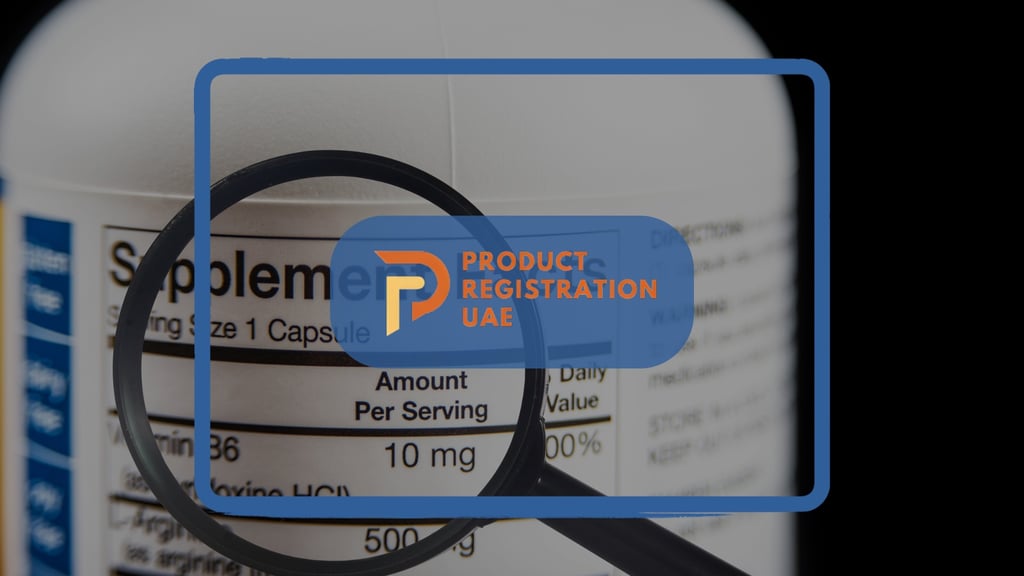What Authorities Check on Labels?
Get your supplement approved fast. Learn what UAE regulators check on your label and avoid costly delays or rejections with Product Registration UAE Experts.


Get Your Supplement Approved:
What UAE Authorities Really Check on Your Label
Think your supplement label is ready for the UAE market? Think again.
Regulatory authorities in the UAE are laser-focused on label accuracy, especially when it comes to health supplements.
Even a small mistake on your label can lead to rejection, delays, and costly relabeling.
Why Is Supplement Label Review So Critical in the UAE?
The UAE considers health supplements a sensitive product category, often subject to scrutiny by MOHAP and other regulatory bodies.
Labeling is one of the first filters these authorities use to determine compliance.
If your label doesn't pass their review, your product won’t even make it to the next stage.
What Do UAE Authorities Look for During Supplement Label Review?
Here are the most common checkpoints inspectors flag during the review process:
1. Bilingual Compliance
Your label must be in both Arabic and English — and it’s not just a translation job.
The Arabic version must follow specific terminology standards, font size rules, and government-approved phrasing.
2. Ingredient Declaration
Authorities require a full list of active and inactive ingredients.
Hidden or unapproved ingredients, even in trace amounts, can trigger rejection.
3. Health & Marketing Claims
Labels must avoid claims that suggest treatment, prevention, or curing of diseases.
Claims like "boosts immunity" or "supports weight loss" are often red-flagged unless scientifically substantiated and approved.
4. Dosage Instructions
Clear daily intake guidance is mandatory. Labels missing this data are automatically non-compliant.
5. Manufacture & Expiry Dates
The format of these dates must follow GCC-standard rules and must appear in both Arabic and English.
6. Country of Origin & Manufacturer Info
Labels must clearly mention where the product is made and the name and address of the manufacturer.
7. Batch Number & Storage Conditions
Missing batch codes or unclear storage instructions are common rejection points.
Real Questions Companies Are Asking — Answered
“Can I use the same label I use in the U.S. or Europe?”
No. UAE regulations are unique and stricter in certain areas, especially regarding Arabic compliance, claim restrictions, and date formatting.
“Is it okay to use stickers for Arabic translation?”
Not for long-term registration. Authorities prefer that Arabic is integrated into the primary label design — especially for supplements.
“Can I say ‘boosts energy’ or ‘immune support’?”
Only if you have scientific evidence and the phrase aligns with approved claims lists. Otherwise, it will be flagged.
“What happens if the label fails inspection?”
You’ll have to resubmit, often with relabeling or repackaging. This leads to delays, extra cost, and potential reclassification of your product.
How to Make Sure Your Supplement Label Gets Approved
✅ Get a professional label validation review — including both Arabic and English.
✅ Use a compliance expert who understands MOHAP and GCC labeling rules.
✅ Don’t rely on translations alone. Use official phrasing, formatting, and structure.
Final Tip: Fix the Label Before You Ship
Fixing a label before registration is a fraction of the cost compared to after rejection.
Supplement approvals are won or lost at the labeling stage.
Need help reviewing your supplement label before submission?
Start a chat now using the button at the bottom-right of your screen, or contact us directly.
Don’t Stop Here — Strengthen Your Entire Compliance Strategy
Clarify your regulatory path with How to Classify Supplements Correctly in UAE 2025.
See what slows down market access in Cut Product Approval Delays in UAE – Fast 2025 Guide.
Explore Top 10 UAE Product Registration Mistakes in 2025 to avoid hidden label errors that lead to rejections.
If your product label includes Arabic, make sure you understand the rules — this blog breaks down everything UAE authorities expect.


